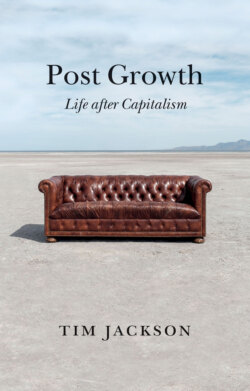Читать книгу Post Growth - Tim Jackson - Страница 20
Crime scene investigation
ОглавлениеThe most obvious answer to this question is: no one. Capitalism is alive and well, thank you very much, and living the high life in New York and Dubai and London. Beijing, even. And Davos, certainly. Despite their anxiety, no one at the World Economic Forum was seriously about to give up on capitalism. The introspection was an elaborate show. In fact, the principal outcome from the surprising self-flagellation was an all-too-familiar refrain: capitalism is dead; long live capitalism!
Stakeholder capitalism; capitalism with purpose; ‘woke’ capitalism, as the New York Times amusingly called it. These were to be the new incarnations of an old regime. They were paraded almost daily by those who, sometimes by their own admission, had benefited most from the old regime. (Why should we not entirely trust them? I couldn’t possibly imagine!) But beyond the sometimes distasteful rhetoric, and the unmistakable impression of power clinging on to power, lay the dawning realization that something extraordinary had happened to the foundational narrative on which social progress depends. So the question remains. Who or what was responsible?11
For a while now, the most convenient suspect has been the global financial crisis. I’ve lost count of the number of attempts I’ve seen to compare the average growth rate before 2008 with the average growth rate in the years that followed. It’s so easy to conclude that the problems arise from the continuing ‘headwinds’ caused by the crisis. These commentaries miss the point completely. The decline was already happening decades before the crisis struck. The peak in labour productivity growth in most advanced economies was more than half a century ago.
Every now and then, a suspicion has caught hold that the problems are more deeply rooted. In November 2013, five years after the collapse of Lehman Brothers, the former World Bank chief economist and US Treasury Secretary Larry Summers gave a speech to the International Monetary Fund which sent something of a shock wave through the audience. The continuing uncertainties of the post-crisis years were not just temporary after-shocks. ‘The underlying problem may be there forever,’ he said. Low and declining growth may just be the ‘new normal’.12
Summers was certainly not the only, or even the first, but he was certainly the most well-known economist to make such a claim. The repercussions were profound. For a while, it became acceptable to ask previously unthinkable questions. What if there just isn’t so much growth to be had anymore? What if sluggish demand is here to stay? The term ‘secular stagnation’ – first coined in the 1930s – was revived to describe a phenomenon that was becoming too obvious to miss: an increasingly visible long-term decline in growth rates, particularly in the mature economies of the West. As the futurist Martin Ford pointed out: ‘There are good reasons to believe that the economic Goldilocks period has come to an end for many developed nations.’13
The reputation of the economic system (and of economics itself) certainly took a pretty heavy beating during the financial crisis and has struggled to regain its mojo in the intervening decade or so since. But to attribute capitalism’s woes to that time and that time alone is certainly wrong. The cracks were already visible beneath the shiny surface long before the crisis ‘made them manifest’.
